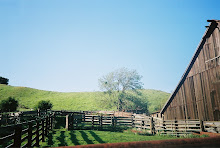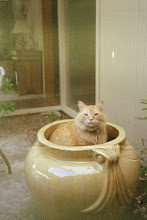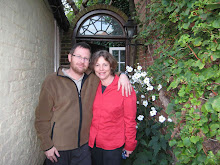But having a Colette in the family is like having a deathless raconteur who shall keep your family alive for as long as there are human beings who read or listen. These novelettish biographies were published around the 1950's so even without me googling it, I am sure Colette and her then still living brother had long both passed away too. Yet here they, and the rest of the family, are as alive as the person next to you. How common is it, for example, for us to have had mothers who were full-time housewives, had grown old doing mostly nothing but housework, and still thought of their family and household concerns up to their dying days? Yet only a Colette can write about a mother like that (her own) with a memorably bittersweet nostalgia like this (her mother already 71 years old at the time, a widow, with various illnesses):
"At five o'clock in the morning I would be awakened by the clank of a full bucket being set down in the kitchen sink immediately opposite my room.
"'What are you doing with that bucket, mother? Couldn't you wait until Josephine (the househelp) arrives?'
"And out I hurried. But the fire was already blazing, fed with dry wood. The milk was boiling on the blue-tiled charcoal stove. Nearby, a bar of chocolate was melting in a little water for my breakfast, and, seated squarely in her cane armchair, my mother was grinding the fragrant coffee which she roasted herself. The morning hours were always kind to her. She wore their rosy colours in her cheeks. Flushed with a brief return to health, she would gaze at the rising sun, while the church bell rang for early Mass, and rejoice at having tasted, while we still slept, so many forbidden fruits.
"The forbidden fruits were the over-heavy bucket drawn up from the well, the firewood split with a billhook on an oaken block, the spade, the mattock, and above all the double steps propped against the gable-windows of the attic, the flowery spikes of the too-tall lilacs, the dizzy cat that had to be rescued from the ridge of the roof. All the accomplices of her old existence as a plump and sturdy little woman, all the minor rustic divinities who once obeyed her and made her so proud of doing without servants, now assumed the appearance and position of adversaries. But they reckoned without that love of combat which my mother was to keep till the end of her life. At seventy-one dawn still found her undaunted, if not always undamaged. Burnt by fire, cut with the pruning knife, soaked by melting snow or spilt water, she had always managed to enjoy her best moments of independence before the earliest risers had opened their shutters. She was able to tell us of the cats' awakening, of what was going on in the nests, of news gleaned, together with the morning's milk and the warm loaf, from the milkmaid and the baker's girl, the record in fact of the birth of a new day.
"It was not until one morning when I found the kitchen unwarmed and the blue enamel saucepan hanging on the wall, that I felt my mother's end to be near. Her illness knew many respites, during which the fire flared up again on the hearth, and the smell of fresh bread and melting chocolate stole under the door together with the cat's impatient paw. These respites were periods of unexpected alarms. My mother and the big walnut cupboard were discovered together in a heap at the foot of the stairs, she having determined to transport it in secret from the upper landing to the ground floor. Whereupon my elder brother insisted that my mother should keep still and that an old servant should sleep in the little house. But how could an old servant prevail against a vital energy so youthful and mischievous that it contrived to tempt and lead astray a body already half fettered by death? My brother, returning before sunrise from attending a distant patient, one day caught my mother red-handed in the most wanton of crimes. Dressed in her nightgown, but wearing heavy gardening sabots, her little grey septuagenarian's plait of hair turning up like a scorpion's tail on the nape of her neck, one foot firmly planted on the crosspiece of the beech trestle, her back bent in the attitude of the expert jobber, my mother, rejuvenated by an indescribable expression of guilty enjoyment, in defiance of all her promises and of the freezing morning dew, was sawing logs in her own yard."
Think: apart from literature, where one writes from the heart, which magical thing here on earth can make a brief, solitary dawn in a forgotten place on a forgotten day, eternal like this?












